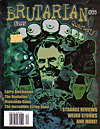
“Rebecca’s Hell” by Resa Nelson
“The Devil Orchard” by Darren Speegle
Taking a riff from Mad Magazine, the contents page of Brutarian Quarterly includes the words, Brutarian Quarterly, $4 an issue. Cheap for such a work of unsurpassed genius. And you know, I have to agree. You’ll get quite a lot for your money: interviews with offbeat artists, a profile of Larry Buchanan (Mars Needs Women), tons of book/zine/music reviews, Ozzy Fide’s B-list movie reviews (always a hoot), and three fine short stories—the focus of this review.
The star of the trio is Megan Crewe’s “Horns,” a dark fairy tale about lost innocence and growing up. Or, at least, I think that’s what it’s about. If I asked ten readers what this story meant, I suspect I’d get a half dozen unique opinions. There’s ambiguity here, but it’s a good kind of ambiguity: the kind that keeps you wondering about the story.
Samantha, the protagonist of “Horns,” is twenty-five and a virgin. One mythical creature lives nearby in Mrs. Eton’s garage; another lives in Sam’s home. Both creatures are beautiful, both sacred in their own way, but Sam’s love for one forces her to harm the other.
Crewe’s descriptions bring her world alive:
White paint flaked off like dandruff on the hay, fluttering in the wind.
The drift of light in the stairwell stained the wallpaper a tepid orange. It glowered over the antique rose pattern. The petals seemed to wilt.
What’s truly masterful about Crewe’s prose is the way her imagery underscores her story. Light and dark are at war here; the windows of Sam’s home, initially “flat black eyes,” later radiate a yellow glow, and Sam’s transfiguration comes with a spectacular display.
“Rebecca’s Hell” by Resa Nelson is the simplest tale of the three. Peter, a university art professor, is “overly crumpled for his age,” an embittered bachelor who delights in quenching the hopes of his over-eager students. Rebecca, another professor in the Art Department, is Peter’s great love. He lost her to an art critic some years ago, but continues to see her at work every day. Love’s a bitch.
After the faculty Halloween party, Peter and his friends, already tipsy from tequila-laced punch, indulge in a hash pipe and magic mushrooms. Rebecca stays sober—she scarcely touches her punch. Peter, perhaps because of the hallucinogen, hears Rebecca say, “Earth is hell,” a declaration which sets Peter on the path of self-discovery.
For me, that’s when the story takes off. Peter seems little better than a caricature before his drug binge, but his trip through surreality makes his character come alive. Soon after a surprising setback (no spoilers here), a Catholic priest becomes the pivot for his journey. “You earn who you become,” he tells Peter, “and you become what you earn.” Communion in this church has a decidedly different flavor.
“Rebecca’s Hell” isn’t a wholly satisfying story. I’d have liked it to be longer, as Peter’s metamorphosis seemed rushed, and I’m still bothered by Peter’s initial two-dimensionality. Still, Nelson’s writing is smooth, she held my interest right to the very end, and her dream/hallucination/supernatural scenes were a delight.
Darren Speegle’s “The Devil Orchard,” subtitled “Der Teufelobstgarten,” is an odd tale in more ways than one. The protagonist and his girlfriend are taking a bike tour through central Europe when they come upon a scenic guest house. It lies in the shadow of a Roman ruin—a temple to the goddess Diana, we learn—and in its backyard is an apple orchard planted on Druidic holy ground. Because of its checkered past (site of a Pyrrhic battle between the Romans and the Celts; site also of a mysterious, ill-fated Nazi skirmish), the locals call the orchard Der Teufelobstgarten—the Devil Orchard.
Anyone steeped in the culture of horror movies knows what to expect, yet they’d be flat-out wrong. One of the strengths of “The Devil Orchard” is that it consistently confounded my expectations. For example, when the couple make love atop a flat, altar-like stone at the orchard’s center,
I started a cigarette and she extinguished it against the bark of the tree, drawing me down on top of her.
She puts out the cigarette by stubbing it against a tree—the largest tree in an area sacred to Druids? What is she thinking? And, later, the couple venture deeper into the darkness to investigate the sound of a motor, for no reason than to “see what’s below.” They’re doomed, right?
That’s what tickles me about “The Devil Orchard”: it seems like Speegle is reading my mind and is having a ball spinning his story in different directions. I have to say, however, that the ending left me unsatisfied. There’s a brush with the strange, and then the travelogue resumes once again.
The other oddity in “The Devil Orchard” is the language. I get the sense that English is not Speegle’s first language; either that, or the story has been translated from German. How else can I explain sentences like this:
We rode alongside a fence of electric wire, automobile batteries appearing intermittently, then immediately as we reached out, laughing, to touch the containment of animals unseen.
But such awkward lines are counterbalanced by beauties like this:
The stub of my cigarette arced out into the night, spraying embers like fiery salt.
It’s a strange tale indeed, one of poetic flashes mixed with verbal pratfalls, supernatural menace laced with the bland, the ordinary. I’m curious to hear what others think about it.